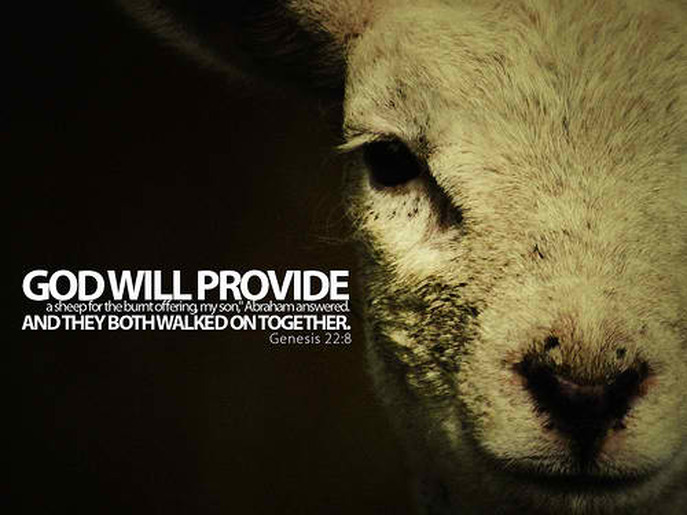The Foreshadowings of Jesus
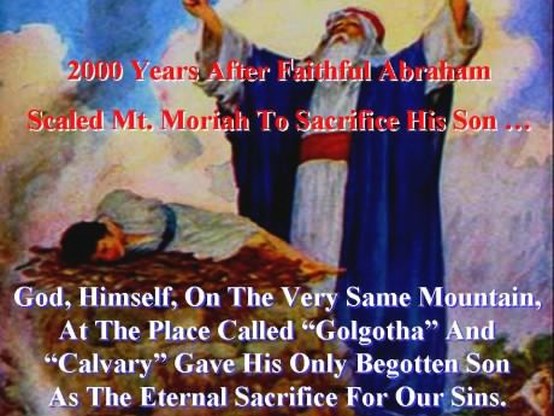
The First Adam and the Last Adam (Genesis)
Romans 5:14-21, Paul says, "Nevertheless death reigned from Adam until Moses, even over those who had not sinned in the likeness of the offense of Adam, who is a type of Him who was to come. But the free gift is not like the transgression. For if by the transgression of the one the many died, much more did the grace of God and the gift by the grace of the one Man, Jesus Christ, abound to the many. The gift is not like that which came through the one who sinned; for on the one hand the judgment arose from one transgression resulting in condemnation, but on the other hand the free gift arose from many transgressions resulting in justification. For if by the transgression of the one, death reigned through the one, much more those who receive the abundance of grace and of the gift of righteousness will reign in life through the One, Jesus Christ. So then as through one transgression there resulted condemnation to all men, even so through one act of righteousness there resulted justification of life to all men. For as through one man's disobedience the many were made sinners, even so through the obedience of the One the many will be made righteous. The Law came in so that the transgression would increase; but where sin increased, grace abounded all the more, so that, as sin reigned in death, even so grace would reign through righteousness to eternal life through Jesus Christ our Lord."
1 Corinthians 15:22, Paul writes, "For as in Adam all die, so also in Christ all will be made alive."
1 Corinthians 15:45, Paul states, "So also it is written, 'The first man, Adam, became a living soul.' The last Adam became a life-giving spirit. However, the spiritual is not first, but the natural; then the spiritual. The first man is from earth, earthy; the second man is from heaven."
Adam and Jesus were the only two men born without sin, in the image and likeness of God. All born after Adam were born in the likeness of Adam.
Genesis 5:3 states, "When Adam had lived one hundred and thirty years, he became the father of a son in his own likeness, according to his image, and named him Seth.
We are born 'in Adam' and through the grace of God, we have the option of
accepting Jesus, being born again, and becoming 'in Christ.' We are transformed from sinners to saints when we go from 'in Adam' to
'in Christ.' (see new creation and transformation)
Abraham's Only Son (Genesis)
Genesis 22:2: "And He said, "Take now your son, your only son Isaac, whom you love..." God refers to Isaac as Abraham's "only son," the one whom he "loves."
God does not recognize Ishmael (Sarah became impatient with God's promise of a son and arranged for her maid, Hagar, to conceive a child from Abraham - this child was named Ishmael) as Abraham's son. The son of faith in God was Isaac, and on him were God's blessings placed.
This is a parallel to God the Father, and His love for His only son, Jesus
Christ.
Gen 22:3:
"...took two of his young men with him, and Isaac his son..."
The two men are types of the two thieves that hung on crosses on either
side of Jesus.
Gen 22:4: "Then on the third day Abraham lifted his eyes and saw the
place afar off."
It took 3 days for Abraham, walking with Isaac and the two men with them, to walk to the place where he would do the offering. When
God asked Abraham to do the offering, Abraham was so obedient that the act was already done. And just as Jesus was dead in the tomb for 3 days before rising again, so for 3 days Isaac was virtually dead while on his way to the mount with his father and the two helpers.
Gen 22:6: "So Abraham took the wood of the burnt offering and laid
it on Isaac his son..." The wood Isaac carried is a foreshadowing of the cross that Jesus would carry 2,000 years later.
Gen 22:8: "And Abraham said, "My son, God will provide himself a lamb for a burnt offering."
Abraham prophesizes that God will provide Himself a lamb as a substitute offering. This He did a few moments later, but Abraham's words were fulfilled on a much grander scale some 2,000 years later.
The eternal Word "became flesh, and dwelt among us, and we beheld His glory" (John 1:14). Jesus is referred to by John the Baptist as "the Lamb of
God which takes away the sins of the world!" (John 1:29).
God "provided Himself a Lamb."
Gen 22:13: "And Abraham lifted up his eyes, and behold, behind him a lamb caught in a thicket..."
The lamb that God provided was found caught in a thicket of thorns,
prefiguring the crown of thorns that Jesus the Messiah would wear 2,000 years later as the Lamb of God, sacrificed for the sins of the world.
Gen 22:18: "In your seed all the nations of the earth shall be blessed,
because you have obeyed my voice."
God tells Abraham that "in your seed" all the nations of the earth
shall be blessed. The New Testament documents record that Jesus
was a descendent of Abraham (Matt 1:2 - 1:16).
Gen 22:19: "So Abraham returned to his young men, and they rose and went together to Beersheba..."
Isaac paralleled Jesus Christ in many ways. Both were children of promise. Isaac was promised to Abraham, as Jesus Christ was the Savior promised to Israel. Both were born in a way that was against nature. Isaac was born to a (previously) barren woman who was well beyond her child-bearing years. Jesus Christ was born of a virgin. Both were
mocked by their kindred. They were both to be sacrificed without putting up any fight.
Romans 5:14-21, Paul says, "Nevertheless death reigned from Adam until Moses, even over those who had not sinned in the likeness of the offense of Adam, who is a type of Him who was to come. But the free gift is not like the transgression. For if by the transgression of the one the many died, much more did the grace of God and the gift by the grace of the one Man, Jesus Christ, abound to the many. The gift is not like that which came through the one who sinned; for on the one hand the judgment arose from one transgression resulting in condemnation, but on the other hand the free gift arose from many transgressions resulting in justification. For if by the transgression of the one, death reigned through the one, much more those who receive the abundance of grace and of the gift of righteousness will reign in life through the One, Jesus Christ. So then as through one transgression there resulted condemnation to all men, even so through one act of righteousness there resulted justification of life to all men. For as through one man's disobedience the many were made sinners, even so through the obedience of the One the many will be made righteous. The Law came in so that the transgression would increase; but where sin increased, grace abounded all the more, so that, as sin reigned in death, even so grace would reign through righteousness to eternal life through Jesus Christ our Lord."
1 Corinthians 15:22, Paul writes, "For as in Adam all die, so also in Christ all will be made alive."
1 Corinthians 15:45, Paul states, "So also it is written, 'The first man, Adam, became a living soul.' The last Adam became a life-giving spirit. However, the spiritual is not first, but the natural; then the spiritual. The first man is from earth, earthy; the second man is from heaven."
Adam and Jesus were the only two men born without sin, in the image and likeness of God. All born after Adam were born in the likeness of Adam.
Genesis 5:3 states, "When Adam had lived one hundred and thirty years, he became the father of a son in his own likeness, according to his image, and named him Seth.
We are born 'in Adam' and through the grace of God, we have the option of
accepting Jesus, being born again, and becoming 'in Christ.' We are transformed from sinners to saints when we go from 'in Adam' to
'in Christ.' (see new creation and transformation)
Abraham's Only Son (Genesis)
Genesis 22:2: "And He said, "Take now your son, your only son Isaac, whom you love..." God refers to Isaac as Abraham's "only son," the one whom he "loves."
God does not recognize Ishmael (Sarah became impatient with God's promise of a son and arranged for her maid, Hagar, to conceive a child from Abraham - this child was named Ishmael) as Abraham's son. The son of faith in God was Isaac, and on him were God's blessings placed.
This is a parallel to God the Father, and His love for His only son, Jesus
Christ.
Gen 22:3:
"...took two of his young men with him, and Isaac his son..."
The two men are types of the two thieves that hung on crosses on either
side of Jesus.
Gen 22:4: "Then on the third day Abraham lifted his eyes and saw the
place afar off."
It took 3 days for Abraham, walking with Isaac and the two men with them, to walk to the place where he would do the offering. When
God asked Abraham to do the offering, Abraham was so obedient that the act was already done. And just as Jesus was dead in the tomb for 3 days before rising again, so for 3 days Isaac was virtually dead while on his way to the mount with his father and the two helpers.
Gen 22:6: "So Abraham took the wood of the burnt offering and laid
it on Isaac his son..." The wood Isaac carried is a foreshadowing of the cross that Jesus would carry 2,000 years later.
Gen 22:8: "And Abraham said, "My son, God will provide himself a lamb for a burnt offering."
Abraham prophesizes that God will provide Himself a lamb as a substitute offering. This He did a few moments later, but Abraham's words were fulfilled on a much grander scale some 2,000 years later.
The eternal Word "became flesh, and dwelt among us, and we beheld His glory" (John 1:14). Jesus is referred to by John the Baptist as "the Lamb of
God which takes away the sins of the world!" (John 1:29).
God "provided Himself a Lamb."
Gen 22:13: "And Abraham lifted up his eyes, and behold, behind him a lamb caught in a thicket..."
The lamb that God provided was found caught in a thicket of thorns,
prefiguring the crown of thorns that Jesus the Messiah would wear 2,000 years later as the Lamb of God, sacrificed for the sins of the world.
Gen 22:18: "In your seed all the nations of the earth shall be blessed,
because you have obeyed my voice."
God tells Abraham that "in your seed" all the nations of the earth
shall be blessed. The New Testament documents record that Jesus
was a descendent of Abraham (Matt 1:2 - 1:16).
Gen 22:19: "So Abraham returned to his young men, and they rose and went together to Beersheba..."
Isaac paralleled Jesus Christ in many ways. Both were children of promise. Isaac was promised to Abraham, as Jesus Christ was the Savior promised to Israel. Both were born in a way that was against nature. Isaac was born to a (previously) barren woman who was well beyond her child-bearing years. Jesus Christ was born of a virgin. Both were
mocked by their kindred. They were both to be sacrificed without putting up any fight.
Water in the Rock (Exodus)
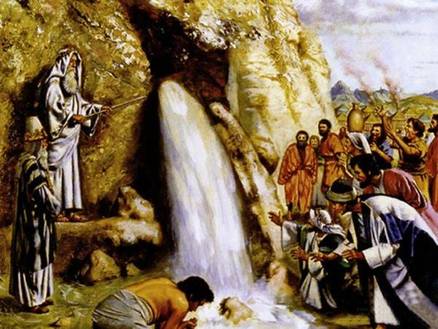
Two stories of Moses and the Israelites described how they were miraculously given water from rocks in the desert. The first occurred at Rephidum (Exodus 17:1-7) and the second at Kadesh (Numbers 20:1-13). In 1 Corinthians 10:4, Paul identified the experience of the Israelites as an encounter with Christ; "and all drank the same spiritual drink, for they were drinking from a spiritual rock which followed them; and the rock was Christ." Paul was saying the rock was to them what Christ is to us, a source of sustenance.
The 5 Different Offerings (Leviticus)
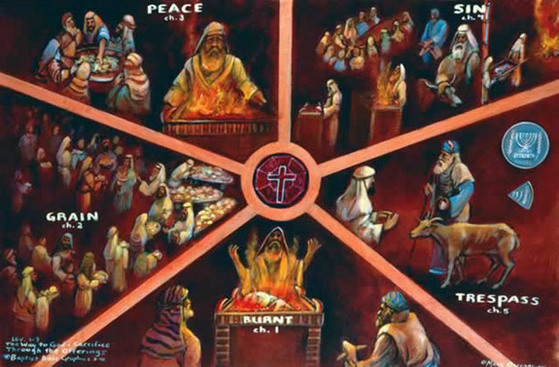
In each chapter of Leviticus 1-5, the law of five different offerings is explained. Each of these offerings is a foreshadowing of the coming of our Savior, Jesus Christ, by whom the law was fulfilled. See detailed charts at the end of Leviticus.
The Bronze Serpent (Numbers)
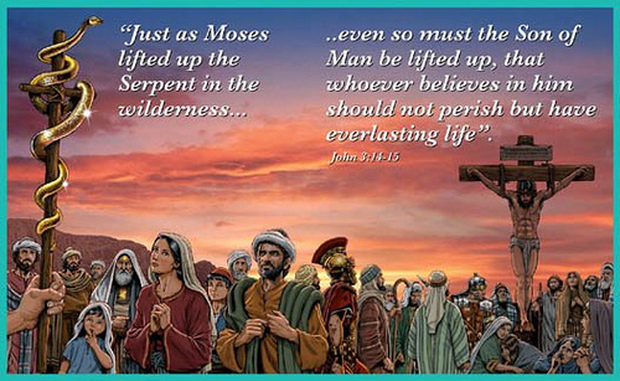
After the children of Israel left Egypt and were wandering in the wilderness, Numbers 21:4-6 sets the scene, "Then they set out from Mount Hor by the way of the Red sea, to go around the land of Edom; and the people became impatient becasue of the journey. The people spoke against God and Moses, 'Why have you brought us up out of Egypt to die in the wilderness? For there is no food and water and we loathe this miserable food.' (the manna that God gave them daily). The Lord sent fiery serpents among the people and they bit the people, so that many people of Israel died."
Verses 7-9 describe how this dire situation was remedied. "So the people came to Moses and said, 'We have sinned, because we have spoken against the Lord and you; intercede with the Lord, that He may remove the serpents from us.' And Moses interceded for the people. Then the LORD said to Moses, 'Make a fiery serpent, and set it on a standard: and it shall come about, that everyone who is bitten, when he looks at it, he will live.'
The snake represents sin, and the snake bitten person is a lost person who is dead in their sins. Those bitten by the serpents needed a Savior.
Jesus Christ became sin for us when all our sin was placed upon Him
on the cross. The bronze serpant was a shadow of the things to come.
In 2 Corinthians 5:21, Paul says, "He made Him who knew no sin to be sin on our behalf, so that we might become the righteousness of God in Him."
Jesus said in John 3:14-16, "As Moses lifted up the serpent in the wilderness, even so must the Son of Man be lifted up; so that whoever believes will in Him have eternal life. For God so loved the world, that He gave His only begotten Son, that whoever believes in Him shall not perish, but have eternal life."
Just as the snake was lifted up on a pole in the wilderness, Christ was
lifted up on the cross. All who believe that He gave His life for their sin and rose from the dead, will be forgiven of all sins and have eternal life in Him. Amen!! :-)
Verses 7-9 describe how this dire situation was remedied. "So the people came to Moses and said, 'We have sinned, because we have spoken against the Lord and you; intercede with the Lord, that He may remove the serpents from us.' And Moses interceded for the people. Then the LORD said to Moses, 'Make a fiery serpent, and set it on a standard: and it shall come about, that everyone who is bitten, when he looks at it, he will live.'
The snake represents sin, and the snake bitten person is a lost person who is dead in their sins. Those bitten by the serpents needed a Savior.
Jesus Christ became sin for us when all our sin was placed upon Him
on the cross. The bronze serpant was a shadow of the things to come.
In 2 Corinthians 5:21, Paul says, "He made Him who knew no sin to be sin on our behalf, so that we might become the righteousness of God in Him."
Jesus said in John 3:14-16, "As Moses lifted up the serpent in the wilderness, even so must the Son of Man be lifted up; so that whoever believes will in Him have eternal life. For God so loved the world, that He gave His only begotten Son, that whoever believes in Him shall not perish, but have eternal life."
Just as the snake was lifted up on a pole in the wilderness, Christ was
lifted up on the cross. All who believe that He gave His life for their sin and rose from the dead, will be forgiven of all sins and have eternal life in Him. Amen!! :-)
Moses does not lead God's people to the promised land
(Deuteronomy)
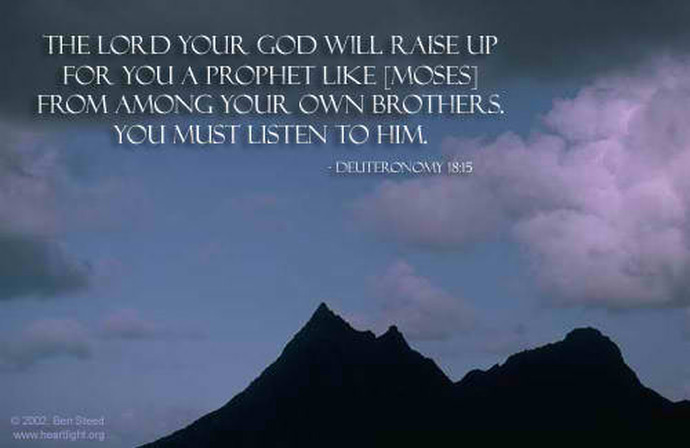
The book of Deuteronomy was quoted over 90 times
in the New Testament.
In 1:23, Moses chooses 12 men, one man for each tribe.
In Mark 3:14, Jesus appointed 12 men, so that they could be with Him and that He could send them out to preach.
In Deuteronmy 18:15-18, Moses says, "The Lord your God will raise up for you a prophet like me from among you, from your contrymen, you shall listen to him. This is according to all that you asked of the Lord your God in Horeb on the day of the assembly, saying, 'Let me not hear again the voice of the Lord my God, let me not see this great fire anymore, or I will die.' The Lord said to me, 'They have spoken well. I will raise up a prophet from among their countrymen like you, and I will put My words in his mouth, and he shall speak to them all that I command him.'
Moses (led by God) commissions Joshua to lead Israel into the promised land toward the end of Deuteronomy (31:23). The name “Joshua” is translated from the Hebrew “Yehoshua” — which is the same name that is translated “Iesous” in the Greek Septuagint. In our English New Testament Bibles, the name “Iesous” is translated “Jesus”. The
name of Joshua’s father — Jehozadek - means “Jehovah Righteousness.”
(34:5) Moses dies on Mount Nebo and is not able to lead God’s people into the promised land. Instead, it is a man by the name of Joshua that leads God’s people into the promised land. Now, Moses is regarded in many parts of Scripture as being the embodiment of the Law. This is significant because one of the key themes of the New Testament Gospel is that the Law cannot lead God’s people into the promised land. Instead it is Jesus – or Joshua — who takes the place of the Law in leading the people of God into the promised land.
in the New Testament.
In 1:23, Moses chooses 12 men, one man for each tribe.
In Mark 3:14, Jesus appointed 12 men, so that they could be with Him and that He could send them out to preach.
In Deuteronmy 18:15-18, Moses says, "The Lord your God will raise up for you a prophet like me from among you, from your contrymen, you shall listen to him. This is according to all that you asked of the Lord your God in Horeb on the day of the assembly, saying, 'Let me not hear again the voice of the Lord my God, let me not see this great fire anymore, or I will die.' The Lord said to me, 'They have spoken well. I will raise up a prophet from among their countrymen like you, and I will put My words in his mouth, and he shall speak to them all that I command him.'
Moses (led by God) commissions Joshua to lead Israel into the promised land toward the end of Deuteronomy (31:23). The name “Joshua” is translated from the Hebrew “Yehoshua” — which is the same name that is translated “Iesous” in the Greek Septuagint. In our English New Testament Bibles, the name “Iesous” is translated “Jesus”. The
name of Joshua’s father — Jehozadek - means “Jehovah Righteousness.”
(34:5) Moses dies on Mount Nebo and is not able to lead God’s people into the promised land. Instead, it is a man by the name of Joshua that leads God’s people into the promised land. Now, Moses is regarded in many parts of Scripture as being the embodiment of the Law. This is significant because one of the key themes of the New Testament Gospel is that the Law cannot lead God’s people into the promised land. Instead it is Jesus – or Joshua — who takes the place of the Law in leading the people of God into the promised land.
Israel Crosses the Jordan (Joshua)
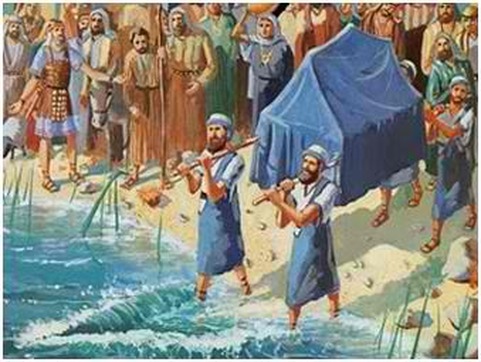
Joshua 1:11- Joshua commands the people, "for within three days you are to cross this Jordan, to go in to possess the land which the
Lord your God is giving you, to possess it."
Jesus was raised from the dead on the third day.
In Acts 10:40, Luke tells us, "God raised Him up on the third day and granted that He become visible,"
The crossing of the Jordan was significant in that God's people could not turn back after crossing once the waters came back; the waters "stood and rose up in one heap" a great distance away at the city of Adam (Joshua 3:16). Notice this is the same chapter and verse as the most often quoted verse in the Bible, John 3:16.
The resurrection of Christ gave believers in Him the opportunity to be dead 'in Adam' and to be eternally alive 'in Christ'. Believers become a new creation in Christ (2 Corinthians 5:17). There would be no turning back - no crossing back over the river of Jordan.
God called Joshua to appoint 12 men. Jesus appointed 12 men to be His apostles. Joshua 4:4, "So Joshua called the twelve men whom he had appointed from the sons of Israel, one man from each tribe;" Luke 6:13
Memorial Stones from Jordan (Joshua)
Joshua 4:3-9, God is speaking to Joshua, "and command them, saying, 'Take up for yourselves twelve stones from here out of the middle of the
Jordan, from the place where the priests' feet are standing firm, and carry them over with you and lay them down in the lodging place where you will lodge tonight.' " Joshua speaking to the 12... "Let this be a sign among you, so that when your children ask later, saying, 'What do these stones mean to you?' then you shall say to them, 'Because the waters of the Jordan were cut off before the ark of the covenant of the Lord; when it crossed the Jordan, the waters of the Jordan were cut off.' So these stones shall become a memorial to the sons of Israel forever."
Joshua 4:22-23, "then you shall inform your children, saying, 'Israel crossed this Jordan on dry ground.' For the Lord your God dried up the waters of the Jordan before you until you had crossed, just as the Lord your God had done to the Red Sea, which He dried up before us until we had crossed;"
The stones are a remembrance of the Lord. This is a shadow of communion when Jesus says in Luke 22:19, "Do this in remembrance
of me." The stones bring focus to God and what He did (parting the Red
Sea and the Jordan), taking the focus off the world. Communion is used in a similar way; it re-directs our focus to Jesus and what He did for
us on the cross. A remembrance.
Lord your God is giving you, to possess it."
Jesus was raised from the dead on the third day.
In Acts 10:40, Luke tells us, "God raised Him up on the third day and granted that He become visible,"
The crossing of the Jordan was significant in that God's people could not turn back after crossing once the waters came back; the waters "stood and rose up in one heap" a great distance away at the city of Adam (Joshua 3:16). Notice this is the same chapter and verse as the most often quoted verse in the Bible, John 3:16.
The resurrection of Christ gave believers in Him the opportunity to be dead 'in Adam' and to be eternally alive 'in Christ'. Believers become a new creation in Christ (2 Corinthians 5:17). There would be no turning back - no crossing back over the river of Jordan.
God called Joshua to appoint 12 men. Jesus appointed 12 men to be His apostles. Joshua 4:4, "So Joshua called the twelve men whom he had appointed from the sons of Israel, one man from each tribe;" Luke 6:13
Memorial Stones from Jordan (Joshua)
Joshua 4:3-9, God is speaking to Joshua, "and command them, saying, 'Take up for yourselves twelve stones from here out of the middle of the
Jordan, from the place where the priests' feet are standing firm, and carry them over with you and lay them down in the lodging place where you will lodge tonight.' " Joshua speaking to the 12... "Let this be a sign among you, so that when your children ask later, saying, 'What do these stones mean to you?' then you shall say to them, 'Because the waters of the Jordan were cut off before the ark of the covenant of the Lord; when it crossed the Jordan, the waters of the Jordan were cut off.' So these stones shall become a memorial to the sons of Israel forever."
Joshua 4:22-23, "then you shall inform your children, saying, 'Israel crossed this Jordan on dry ground.' For the Lord your God dried up the waters of the Jordan before you until you had crossed, just as the Lord your God had done to the Red Sea, which He dried up before us until we had crossed;"
The stones are a remembrance of the Lord. This is a shadow of communion when Jesus says in Luke 22:19, "Do this in remembrance
of me." The stones bring focus to God and what He did (parting the Red
Sea and the Jordan), taking the focus off the world. Communion is used in a similar way; it re-directs our focus to Jesus and what He did for
us on the cross. A remembrance.
The Announcement to Samson's mother (Judges)
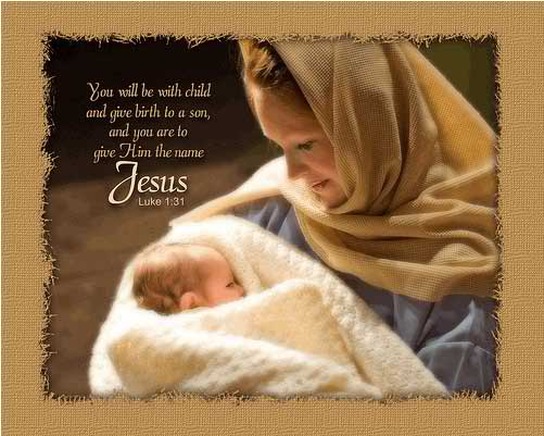
The announcement to Samson’s mother that she would bear a son to lead Israel is a foreshadowing of the announcement to Mary of the birth of the Messiah. God sent His Angel to both women and told them they would “conceive and bear a son” (Judges 13:7; Luke 1:31) who would lead God’s people.
God’s compassionate delivery of His people despite their sin and rejection of Him presents a picture of Christ on the cross. Jesus died to deliver His people—all who would ever believe in Him—from their sin. Although most of those who followed Him during His ministry would eventually
fall away and reject Him, still He remained faithful to His promise and went to the cross to die for us.
God’s compassionate delivery of His people despite their sin and rejection of Him presents a picture of Christ on the cross. Jesus died to deliver His people—all who would ever believe in Him—from their sin. Although most of those who followed Him during His ministry would eventually
fall away and reject Him, still He remained faithful to His promise and went to the cross to die for us.
The Story of Ruth and Naomi (Ruth)

There was a famine in the land and a young man named Elimelech(The Strength of the King) left Bethlehem (Celebrated or Praised) in Judah (Worship) and went to Moab (Incest) with his wife Naomi (the Beautiful Grace of God) and their two sons Mahlon (Sickly) and Chilion (Failing). (Ruth 1:1-2)
The Hebrew meanings of the names are in parentheses.
Apart from God, man's soul –represented by Naomi– can only have a
relationship with his own fallen, sin nature: Elimelech. The products of that relationship can be nothing better than sickly and failing. What else could there be when man does not have a personal relationship with God? That's because apart from God, man can do nothing.
The marriages of Mahlon (Sickly) and Chilion (Failing) to Orpah(Stubbornness) and Ruth (Friendship) produced no children (Ruth
1:3-5).
The two options that man has for a relationship with God are: accept His
friendship through His Son or reject Him through stubbornness (pride).
In this case, the human spirit –Ruth– desires a fulfilled relationship with
God, but it can't be fruitful as long as it's based on human abilities.
Elimelech and his sons came to an end and died in Moab (Ruth 1:3-5).
Like Elimelech, man will die in his sins if he does not choose Jesus as his
savior. However, this picture is of a person's human-sinful nature (the flesh) dying along with its pitiful attempts to please God. In Colossians
2:11-14, Paul says, "and in Him you were also circumcised with a circumcision made without hands, in the removal of the body of the felsh by the circumcision of Christ...made you alive together with Him,
having forgiven us all our transgressions..."
In Galatians 2:20, Paul states, "I have been crucified with Christ; and it is no longer I who live, but Christ lives in me; and the life which I now live in the flesh I live by faith in the Son of God, who loved me and gave Himself for me. I do not nullify the grace of God, for if righteousness comes through the Law, then Christ died needlessly."
Apart from Judah, Naomi (Grace) faded into a mere shell of outward beauty; she became Mara (Bitterness) (Ruth 1:6-7, Ruth 1:19-20).
This certainly shows what happens to man when he recognizes his condition without God. Although the outside may appear to be fulfilled, emptiness lies deep within his heart. That emptiness was intended to only be filled by Jesus Christ.
Naomi resolved that nothing good could ever come of her and gave up her
daughters-in-law Orpah (Stubbornness) and Ruth (Friendship) (Ruth
1:6-9).
When man recognizes his condition –dead in his sins– it is then that he
realizes that there is nothing in him of any value: not his possessions, nor his power, not even his prestige– nothing of the flesh of this world has true and lasting value.
In desperation, Naomi resolved to return to Judah alone, but Ruth
(Friendship) would not leave her (Ruth 1:10-18).
Ruth's entry into Judah touched Boaz (the true and final Strong Redeemer or Pillar). He gladly paid the price to adopt them into his own household
(Ruth 4:7-15).
When man's spirit seeks a relationship with our Redeemer –Jesus– a wonderful thing happens: He finds that the price to be free from sin and death (the wages of sin) have been paid.
Naomi and Ruth were downtrodden and empty-handed when they came to Judah, but the Redeemer met all their needs and loved them as they were (Ruth 2, Ruth 3).
When a man comes to Jesus weary and heavy-burdened, Jesus takes those burdens upon Himself so that the man might experience the peace and contentment that only Jesus is able to provide. In Matthew 11:28, Jesus says, "Come to Me, all who are weary and heavy-laden, and I will give
you rest." and in verse 30, "For My yoke is easy and My burden is light."
Naomi (the Beautiful Grace of God) was restored to be as she was intended to be –leaving her bitterness behind. Soon, the Redeemer joined Ruth to produce a child named Obed (a Servant) (Ruth 4:16-17).
The joining together of Jesus and the human spirit restores man to the state he was created for: a state of unity with God through His beloved Son. That new creation is intended to be one who serves others in love.
(2 Corinthians 5:17)
Obed fulfilled the hope of Naomi by producing David (a Beloved Son) (Ruth 4:16-22). Jesus the Messiah is the son of David (Matthew 1:1).
Jesus is about a relationship. When we turn to Him and rest in the union as a new creation, God will work through us and His perfect will permeates our entire being. Amen!
The Hebrew meanings of the names are in parentheses.
Apart from God, man's soul –represented by Naomi– can only have a
relationship with his own fallen, sin nature: Elimelech. The products of that relationship can be nothing better than sickly and failing. What else could there be when man does not have a personal relationship with God? That's because apart from God, man can do nothing.
The marriages of Mahlon (Sickly) and Chilion (Failing) to Orpah(Stubbornness) and Ruth (Friendship) produced no children (Ruth
1:3-5).
The two options that man has for a relationship with God are: accept His
friendship through His Son or reject Him through stubbornness (pride).
In this case, the human spirit –Ruth– desires a fulfilled relationship with
God, but it can't be fruitful as long as it's based on human abilities.
Elimelech and his sons came to an end and died in Moab (Ruth 1:3-5).
Like Elimelech, man will die in his sins if he does not choose Jesus as his
savior. However, this picture is of a person's human-sinful nature (the flesh) dying along with its pitiful attempts to please God. In Colossians
2:11-14, Paul says, "and in Him you were also circumcised with a circumcision made without hands, in the removal of the body of the felsh by the circumcision of Christ...made you alive together with Him,
having forgiven us all our transgressions..."
In Galatians 2:20, Paul states, "I have been crucified with Christ; and it is no longer I who live, but Christ lives in me; and the life which I now live in the flesh I live by faith in the Son of God, who loved me and gave Himself for me. I do not nullify the grace of God, for if righteousness comes through the Law, then Christ died needlessly."
Apart from Judah, Naomi (Grace) faded into a mere shell of outward beauty; she became Mara (Bitterness) (Ruth 1:6-7, Ruth 1:19-20).
This certainly shows what happens to man when he recognizes his condition without God. Although the outside may appear to be fulfilled, emptiness lies deep within his heart. That emptiness was intended to only be filled by Jesus Christ.
Naomi resolved that nothing good could ever come of her and gave up her
daughters-in-law Orpah (Stubbornness) and Ruth (Friendship) (Ruth
1:6-9).
When man recognizes his condition –dead in his sins– it is then that he
realizes that there is nothing in him of any value: not his possessions, nor his power, not even his prestige– nothing of the flesh of this world has true and lasting value.
In desperation, Naomi resolved to return to Judah alone, but Ruth
(Friendship) would not leave her (Ruth 1:10-18).
Ruth's entry into Judah touched Boaz (the true and final Strong Redeemer or Pillar). He gladly paid the price to adopt them into his own household
(Ruth 4:7-15).
When man's spirit seeks a relationship with our Redeemer –Jesus– a wonderful thing happens: He finds that the price to be free from sin and death (the wages of sin) have been paid.
Naomi and Ruth were downtrodden and empty-handed when they came to Judah, but the Redeemer met all their needs and loved them as they were (Ruth 2, Ruth 3).
When a man comes to Jesus weary and heavy-burdened, Jesus takes those burdens upon Himself so that the man might experience the peace and contentment that only Jesus is able to provide. In Matthew 11:28, Jesus says, "Come to Me, all who are weary and heavy-laden, and I will give
you rest." and in verse 30, "For My yoke is easy and My burden is light."
Naomi (the Beautiful Grace of God) was restored to be as she was intended to be –leaving her bitterness behind. Soon, the Redeemer joined Ruth to produce a child named Obed (a Servant) (Ruth 4:16-17).
The joining together of Jesus and the human spirit restores man to the state he was created for: a state of unity with God through His beloved Son. That new creation is intended to be one who serves others in love.
(2 Corinthians 5:17)
Obed fulfilled the hope of Naomi by producing David (a Beloved Son) (Ruth 4:16-22). Jesus the Messiah is the son of David (Matthew 1:1).
Jesus is about a relationship. When we turn to Him and rest in the union as a new creation, God will work through us and His perfect will permeates our entire being. Amen!
Hannah's Prayer (1 Samuel)
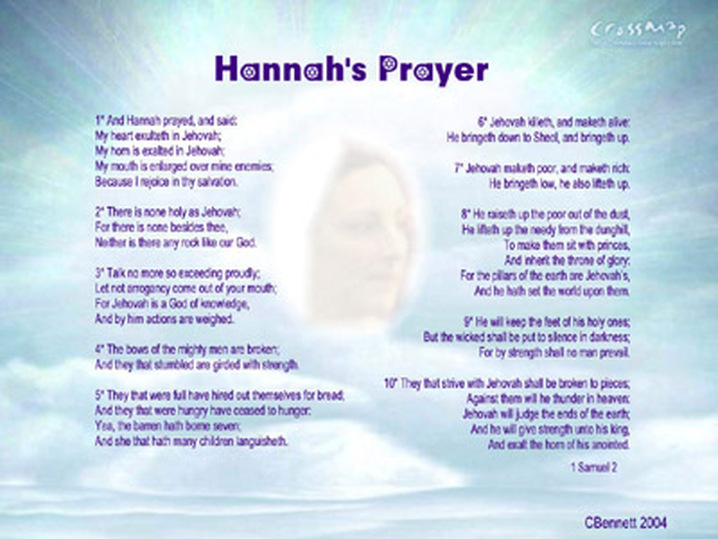
The prayer of Hannah in 1 Samuel 2:1-10 makes several prophetic references to Christ. She extols God as her Rock (v. 2), and we know from the gospel accounts that Jesus is the Rock upon whom we should build our spiritual house. Paul refers to Jesus as the “rock of offense” to the Jews (Romans 9:33). Christ is called the “spiritual Rock” who provided spiritual drink to the Israelites in the wilderness just as He provides “living water” to our souls (1 Corinthians 10:4; John 4:10).
Hannah’s prayer also makes reference to the Lord who will judge the ends of the earth (v. 2:10), while Matthew 25:31-32 refers to Jesus as the Son of man who will come in glory to judge everyone.
Hannah’s prayer also makes reference to the Lord who will judge the ends of the earth (v. 2:10), while Matthew 25:31-32 refers to Jesus as the Son of man who will come in glory to judge everyone.
King David & the Davidic Covenant (2 Samuel)
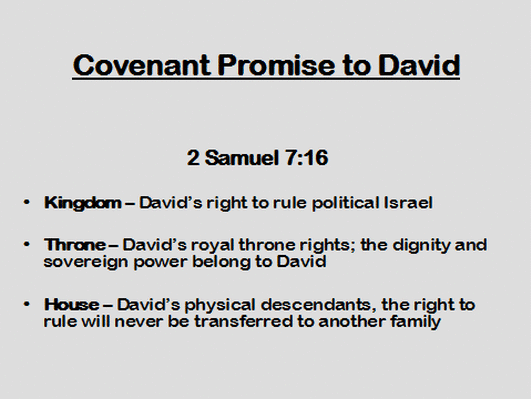
The Lord Jesus Christ is seen primarily in two parts of 2 Samuel. First, the Davidic Covenant as outlined in 2 Samuel 7:16: “Your house and your kingdom will endure forever before me; your throne will be established forever” and reiterated in Luke 1:31-33 in the words of the angel who appeared to Mary to announce Jesus’ birth to her: “He will be great and will be called the Son of the Most High. The Lord God will give him the throne of his father David, and he will reign over the house of Jacob forever; his kingdom will never end." Christ is the fulfillment of the Davidic Covenant; He is the Son of God in the line of David who will reign forever.
Second, Jesus is seen in the song of David at the end of his life
(2 Samuel 22:2-51). He sings of his rock, fortress and deliverer, his
refuge and savior. Jesus is our Rock (1 Corinthians 10:4; 1 Peter 2:7-9), the Deliverer of Israel (Romans 11:25-27), the fortress to whom we
“have fled for refuge to lay hold upon the hope set before us” (Hebrews
6:18 ), and our only Savior (Luke 2:11; 2 Timothy 1:10).
Second, Jesus is seen in the song of David at the end of his life
(2 Samuel 22:2-51). He sings of his rock, fortress and deliverer, his
refuge and savior. Jesus is our Rock (1 Corinthians 10:4; 1 Peter 2:7-9), the Deliverer of Israel (Romans 11:25-27), the fortress to whom we
“have fled for refuge to lay hold upon the hope set before us” (Hebrews
6:18 ), and our only Savior (Luke 2:11; 2 Timothy 1:10).
The Temple & Elijah (1 Kings)
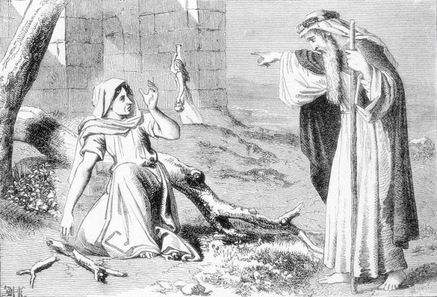
The Temple in Jerusalem, where God’s Spirit would dwell in the Holy of Holies, foreshadows believers in Christ in whom the Holy Spirit resides from the moment of our salvation. Just as the Israelites were to forsake idolatry, so are
we to put away anything that separates us from God. We are His people, the very temple of the living God. In 2 Corinthians 6:16, Paul tells us, “What agreement is there between the temple of God and idols? For we are the temple of the living God. As God has said: ‘I will live with them and walk among them, and I will be their God, and they will be my people.’"
Elijah the prophet was the forerunner of Christ and the Apostles of the New Testament. God enabled Elijah to do miraculous things in order to prove that he was truly a man of God. He raised from the dead the son of the widow of Zarephath, causing her to exclaim, “"Now I know that you are a man of God and that the word of the LORD from your mouth is
the truth (1 Kings 17:24)." In the same way, men of God who spoke His words through His power are evident in the New Testament. Not only did Jesus raise Lazarus from the dead, but He also raised the son of the widow of Nain (Luke 7:14-15) and Jairus’ daughter (Luke 8:52-56). The Apostle Peter raised Dorcas (Acts 9:40) and Paul raised Eutychus (Acts 20:9-12).
Naaman & the Miracles of Elisha (2 Kings)
Jesus uses the stories of the widow of Zarephath from 1 Kings and Naaman in 2 Kings to illustrate the great truth of God’s compassion
toward those the Jews deemed unworthy of God’s grace—the poor, the weak, the oppressed, tax collectors, Samaritans, Gentiles. By citing the examples of a poor widow and a leper, Jesus showed Himself to be the Great Physician who heals and ministers to those in the greatest need of divine sovereign grace.
This same truth was the basis of the mystery of the body of Christ, His Church, which would be drawn from all levels of society, male and female, rich and poor, Jew and Gentile (Ephesians 3:1-6).
Many of the miracles of Elisha foreshadowed those of Jesus Himself. Elisha raised the Shunammite woman’s son (2 Kings 4:34-35), healed Naaman of leprosy (2 Kings 5:1-19), and multiplied loaves of bread to feed a hundred people with some left over (2 Kings 4:42-44).
we to put away anything that separates us from God. We are His people, the very temple of the living God. In 2 Corinthians 6:16, Paul tells us, “What agreement is there between the temple of God and idols? For we are the temple of the living God. As God has said: ‘I will live with them and walk among them, and I will be their God, and they will be my people.’"
Elijah the prophet was the forerunner of Christ and the Apostles of the New Testament. God enabled Elijah to do miraculous things in order to prove that he was truly a man of God. He raised from the dead the son of the widow of Zarephath, causing her to exclaim, “"Now I know that you are a man of God and that the word of the LORD from your mouth is
the truth (1 Kings 17:24)." In the same way, men of God who spoke His words through His power are evident in the New Testament. Not only did Jesus raise Lazarus from the dead, but He also raised the son of the widow of Nain (Luke 7:14-15) and Jairus’ daughter (Luke 8:52-56). The Apostle Peter raised Dorcas (Acts 9:40) and Paul raised Eutychus (Acts 20:9-12).
Naaman & the Miracles of Elisha (2 Kings)
Jesus uses the stories of the widow of Zarephath from 1 Kings and Naaman in 2 Kings to illustrate the great truth of God’s compassion
toward those the Jews deemed unworthy of God’s grace—the poor, the weak, the oppressed, tax collectors, Samaritans, Gentiles. By citing the examples of a poor widow and a leper, Jesus showed Himself to be the Great Physician who heals and ministers to those in the greatest need of divine sovereign grace.
This same truth was the basis of the mystery of the body of Christ, His Church, which would be drawn from all levels of society, male and female, rich and poor, Jew and Gentile (Ephesians 3:1-6).
Many of the miracles of Elisha foreshadowed those of Jesus Himself. Elisha raised the Shunammite woman’s son (2 Kings 4:34-35), healed Naaman of leprosy (2 Kings 5:1-19), and multiplied loaves of bread to feed a hundred people with some left over (2 Kings 4:42-44).
David's Song of Thanksgiving (1 Chronicles)
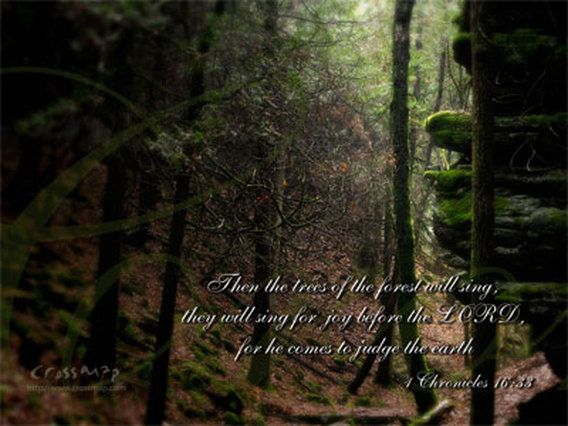
In David’s song of thanksgiving to God in 1 Chronicles 16:33, he refers to the time when God will come “to judge the earth.” This foreshadows Matthew 25, in which Jesus describes the time when He will come to judge the earth. Through the parables of the ten virgins and the talents, He warns that those who are found without the blood of Christ covering their sins will be cast into “outer darkness.” He encourages His people to be ready because when He comes, He will separate the sheep from the goats in judgment.
Part of the Davidic Covenant which God reiterates in chapter 17 refers to the future Messiah who would be a descendant of David. Verses 13-14
describe the Son who will be established in God’s house and whose
throne will be established forever. This can only refer to Jesus Christ.
The King of Kings & the Temple (2 Chronicles)
As with all references to kings and temples in the Old Testament, we see in them a reflection of the true King of Kings—Jesus Christ—and of the temple of the Holy Spirit—His people. Even the best of the kings of Israel had the faults of all sinful men and led the people imperfectly. But when the King of Kings comes to live and reign on the earth in the millennium, he will establish Himself on the throne of all the earth as the rightful heir of David. Only then will we have a perfect King who will reign in righteousness and holiness, something the best of Israel’s kings could only dream of.
Similarly, the great temple built by Solomon was not designed to last forever. Just 150 years later, it was in need of repair from decay and defacing by future generations who turned back to idolatry (2 Kings 12). But the temple of the Holy Spirit—those who belong to Christ—will live forever. We who belong to Jesus are that temple, made not by hands but by the will of God (John 1:12-13). The Spirit who lives within us will never depart from us and will deliver us safely into the hands of God one day (Ephesians 1:13; 4:30). No earthly temple contains that promise.
Part of the Davidic Covenant which God reiterates in chapter 17 refers to the future Messiah who would be a descendant of David. Verses 13-14
describe the Son who will be established in God’s house and whose
throne will be established forever. This can only refer to Jesus Christ.
The King of Kings & the Temple (2 Chronicles)
As with all references to kings and temples in the Old Testament, we see in them a reflection of the true King of Kings—Jesus Christ—and of the temple of the Holy Spirit—His people. Even the best of the kings of Israel had the faults of all sinful men and led the people imperfectly. But when the King of Kings comes to live and reign on the earth in the millennium, he will establish Himself on the throne of all the earth as the rightful heir of David. Only then will we have a perfect King who will reign in righteousness and holiness, something the best of Israel’s kings could only dream of.
Similarly, the great temple built by Solomon was not designed to last forever. Just 150 years later, it was in need of repair from decay and defacing by future generations who turned back to idolatry (2 Kings 12). But the temple of the Holy Spirit—those who belong to Christ—will live forever. We who belong to Jesus are that temple, made not by hands but by the will of God (John 1:12-13). The Spirit who lives within us will never depart from us and will deliver us safely into the hands of God one day (Ephesians 1:13; 4:30). No earthly temple contains that promise.
The Remnant (Ezra)
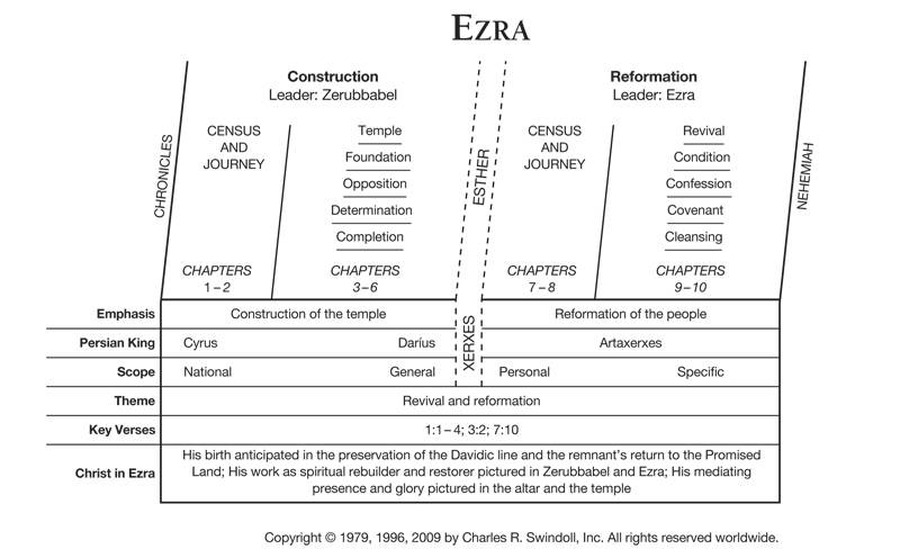
We see in the Book of Ezra a continuation of the biblical theme of the remnant. Whenever disaster or judgment falls, God always saves a tiny remnant for Himself—Noah and his family from the destruction of the flood; Lot’s family from Sodom and Gomorrah; the 7000 prophets reserved in Israel despite the persecution of Ahab and Jezebel. When the Israelites were taken into captivity in Egypt, God delivered His remnant and took them to the Promised Land. Some fifty thousand people return to the land of Judea in Ezra 2:64-67, and yet, as they compare themselves with the numbers in Israel during its prosperous days under King David, their comment is, “We are left this day as a remnant.”
The remnant theme is carried into the New Testament where Paul tells us that “at the present time there is a remnant chosen by grace” (Romans 11:5). Although most people of Jesus’ day rejected Him, there remained a set of people whom God had reserved and preserved in his Son, and in the covenant of His grace. Throughout all generations since Christ, there is the remnant of the faithful whose feet are on the narrow road that leads to eternal life (Matthew 7:13-14). This remnant will be preserved through the power of the Holy Spirit who has sealed them and who will deliver them safely at the last day (2 Corinthians 1:22; Ephesians 4:30).
Fervent Prayer (Nehemiah)
Nehemiah was a man of prayer and he prayed passionately for his people (Nehemiah 1). His zealous intercession for God’s people foreshadows our great Intercessor, Jesus Christ, who prayed fervently for His people in His
high-priestly prayer in John 17. Both Nehemiah and Jesus had a burning love for God’s people which they poured out in prayer to God, interceding for them before the throne.
The Cross (Esther)
In Esther, we are given a behind-the-scenes look at the ongoing struggle of Satan against the purposes of God and especially against His promised Messiah. The entrance of Christ into the human race was predicated upon the existence of the Jewish race. Just as Haman plotted against the Jews in order to destroy them, so has Satan set himself against Christ and God’s people. Just as Haman is defeated on the gallows he built for Mordecai, so does Christ use the very weapon that his enemy devised to destroy Him and His spiritual seed. For the cross, by which Satan planned to destroy the Messiah, was the very means through which Christ “having canceled the written code, with its regulations, that was against us and that stood opposed to us; he took it away, nailing it to the cross. And having disarmed the powers and authorities, he made a public spectacle of them, triumphing over them by the cross” (Colossians 2:14-15). Just as Haman was hanged on the gallows he built for Mordecai, so the devil was crushed by the cross he erected to destroy Christ.
Three Questions from Job (Job)

As Job was pondering the cause of his misery, three questions came to his mind, all of which are answered only in our Lord Jesus Christ. These questions occur in chapter 14. First, in verse 4, Job asks, "Who can bring what is pure from the impure? No one!?" Job’s question comes from a heart that recognizes it cannot possibly please God or become justified in His sight. God is holy; we are not. Therefore, a great gulf exists between man and God, caused by sin. But the answer to Job’s anguished question is found in Jesus Christ. He has paid the penalty for our sin and has exchanged it for His righteousness, thereby making us acceptable in God’s sight (Hebrews 10:14; Colossians 1:21-23; 2 Corinthians 5:17).
Job’s second question, "But man dies and lies prostrate; Man expires, and where is he?" (vs. 14), is another question about eternity and life and death that is answered only in Christ. With Christ, the answer to ‘where is he?’ is eternal life in heaven. Without Christ, the answer is an eternity in “outer darkness” where there is “weeping and gnashing of teeth” (Matthew 25:30).
Job’s third question, found in verse 14, is “If a man dies, will he live again?” Once again, the answer is found in Christ. We do indeed live again if we are in Him. “When the perishable has been clothed with the imperishable, and the mortal with immortality, then the saying that is
written will come true: ‘Death has been swallowed up in victory.’ ‘Where, O death, is your victory? Where, O death, is your sting?’” (1 Corinthians
15:54-55).
Job’s second question, "But man dies and lies prostrate; Man expires, and where is he?" (vs. 14), is another question about eternity and life and death that is answered only in Christ. With Christ, the answer to ‘where is he?’ is eternal life in heaven. Without Christ, the answer is an eternity in “outer darkness” where there is “weeping and gnashing of teeth” (Matthew 25:30).
Job’s third question, found in verse 14, is “If a man dies, will he live again?” Once again, the answer is found in Christ. We do indeed live again if we are in Him. “When the perishable has been clothed with the imperishable, and the mortal with immortality, then the saying that is
written will come true: ‘Death has been swallowed up in victory.’ ‘Where, O death, is your victory? Where, O death, is your sting?’” (1 Corinthians
15:54-55).
God's Provision of a Savior (Psalms)

God’s provision of a Savior for His people is a recurring theme in the Psalms. Prophetic pictures of the Messiah are seen in numerous psalms. Psalm 2:1-12 portrays the Messiah’s triumph and kingdom. Psalm 16:8-11 foreshadows His death and resurrection. Psalm 22 shows us the suffering Savior on the cross and presents detailed prophecies of the crucifixion, all of which were fulfilled perfectly. The glories of the Messiah and His bride are on exhibit in Psalm 45:6-7, while Psalms 72:6-17, 89:3-37, 110:1-7 and 132:12-18 present the glory and universality of His reign.
Wisdom and God's Way (Proverbs)
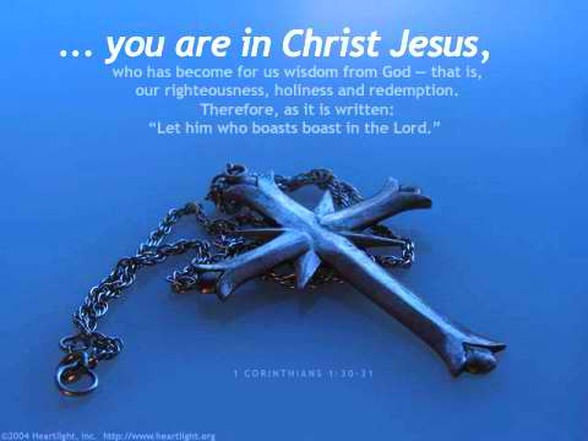
The theme of wisdom and its necessity in our lives finds its fulfillment in Christ. We are continually exhorted in Proverbs to seek wisdom, get wisdom, and understand wisdom. Proverbs also tells us—and repeats it— that the fear of the Lord is the beginning of wisdom (1:7; 9:10). Our fear of the Lord’s wrath and justice is what drives us to Christ, who is the embodiment of God’s wisdom as expressed in His glorious plan of redemption for mankind. In Christ, “in whom are hidden all the treasures of wisdom and knowledge” (Colossians 2:3), we find the answer to our search for wisdom, the remedy for our fear of God, and the “righteousness, holiness and redemption” that we so desperately need
(1 Corinthians 1:30). The wisdom that is found only in Christ is in contrast to the foolishness of the world which encourages us to be wise in our own eyes. But Proverbs also tells us that the world’s way is not God’s way (Proverbs 3:7) and leads only to death (Proverbs 14:12; 16:25).
Vanities and the world's wealth (Ecclesiastes)
For all of the vanities described in the Book of Ecclesiastes, the answer is
Christ. God has placed the desire for eternity in our hearts (Ecclesiastes
3:11) and has provided the Way to eternal life through Christ (John 3:16). We are reminded that striving after the world’s wealth is not only vanity because it does not satisfy (Ecclesiastes 5:10), but even if we could attain it, without Christ we would lose our souls and what profit is there in that (Mark 8:36)? Ultimately, every disappointment and vanity described in Ecclesiastes has its remedy in Christ, the wisdom of God and the only true meaning to be found in life.
(1 Corinthians 1:30). The wisdom that is found only in Christ is in contrast to the foolishness of the world which encourages us to be wise in our own eyes. But Proverbs also tells us that the world’s way is not God’s way (Proverbs 3:7) and leads only to death (Proverbs 14:12; 16:25).
Vanities and the world's wealth (Ecclesiastes)
For all of the vanities described in the Book of Ecclesiastes, the answer is
Christ. God has placed the desire for eternity in our hearts (Ecclesiastes
3:11) and has provided the Way to eternal life through Christ (John 3:16). We are reminded that striving after the world’s wealth is not only vanity because it does not satisfy (Ecclesiastes 5:10), but even if we could attain it, without Christ we would lose our souls and what profit is there in that (Mark 8:36)? Ultimately, every disappointment and vanity described in Ecclesiastes has its remedy in Christ, the wisdom of God and the only true meaning to be found in life.
No Blemish in You (Song of Solomon)

Some Bible interpreters see in Song of Solomon an exact symbolic representation of Christ and His church. Christ is seen as the king, while the church is represented by the Shulamite. While we believe the book should be understood literally as a depiction of marriage, there are some elements that foreshadow the Church and her relationship with her king, the Lord Jesus. Song of Solomon 2:4 describes the experience of every believer who is sought and bought by the Lord Jesus. We are in a place of great spiritual wealth and are covered by His love. Verse 16 of chapter 2 says, “My beloved is mine, and I am his. He pastures his flock among the lilies” (NASB). Here is a picture of not only the security of the believer in Christ (John 10:28-29), but of the Good Shepherd who knows His
sheep—believers—and lays down His life for us (John 10:11).
Because of Him, we are no longer stained by sin, having had our “spots” removed by His blood (Song of Solomon 4:7; Ephesians 5:27).
sheep—believers—and lays down His life for us (John 10:11).
Because of Him, we are no longer stained by sin, having had our “spots” removed by His blood (Song of Solomon 4:7; Ephesians 5:27).
The Coming of the Messiah (Isaiah)
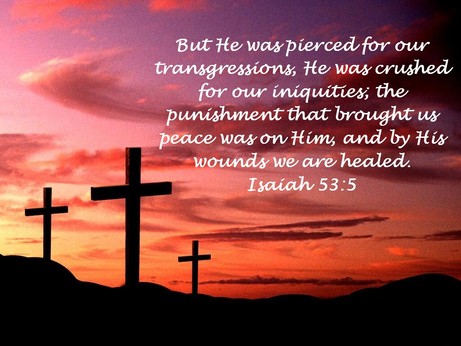
Chapter 53 of Isaiah describes the coming Messiah and the
suffering He would endure in order to pay for our sins. In His sovereignty, God orchestrated every detail of the crucifixion to fulfill every prophecy of this chapter, as well as all other messianic prophecies of the Old Testament. The imagery of chapter 53 is poignant and prophetic and contains a complete picture of the Gospel. Jesus was despised and rejected (v. 3; Luke 13:34; John 1:10-11), stricken by God (v.4; Matthew 27:46), and pierced for our transgressions (v. 5; John 19:34; 1 Peter 2:24). By His suffering, He paid the punishment we deserved and became for us the ultimate and perfect sacrifice (v. 5; Hebrews 10:10). Although He was sinless, God laid on Him our sin, and we became God’s righteousness in Him (2 Corinthians 5:21).
suffering He would endure in order to pay for our sins. In His sovereignty, God orchestrated every detail of the crucifixion to fulfill every prophecy of this chapter, as well as all other messianic prophecies of the Old Testament. The imagery of chapter 53 is poignant and prophetic and contains a complete picture of the Gospel. Jesus was despised and rejected (v. 3; Luke 13:34; John 1:10-11), stricken by God (v.4; Matthew 27:46), and pierced for our transgressions (v. 5; John 19:34; 1 Peter 2:24). By His suffering, He paid the punishment we deserved and became for us the ultimate and perfect sacrifice (v. 5; Hebrews 10:10). Although He was sinless, God laid on Him our sin, and we became God’s righteousness in Him (2 Corinthians 5:21).
A branch from the house of David, Our Righteousness! (Jeremiah)
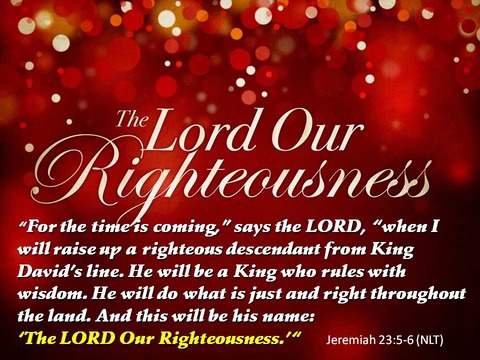
Jeremiah 23:5-6 presents a prophecy of the coming Messiah, Jesus Christ. The prophet describes Him as a Branch from the house of David (v. 5; Matthew 1), the King who would reign in wisdom and righteousness
(v. 5, Revelation 11:15). It is Christ who will finally be recognized by Israel as her true Messiah as He provides salvation for His chosen ones (v. 6; Romans 11:26).
The Weeping Prophet (Lamentations)
Jeremiah was known as the “weeping prophet” for his deep and abiding
passion for his people and their city (Lamentations 3:48-49). This same sorrow over the sins of the people and their rejection of God was expressed by Jesus as He approached Jerusalem and looked ahead to her destruction at the hands of the Romans (Luke 19:41-44). Because
of the Jews’ rejection of their Messiah, God used the Roman siege to punish His people. But God takes no joy in having to punish His children and His offer of Jesus Christ as a provision for sin shows His great compassion on His people. One day, because of Christ, God will wipe away all tears (Revelation 7:17).
(v. 5, Revelation 11:15). It is Christ who will finally be recognized by Israel as her true Messiah as He provides salvation for His chosen ones (v. 6; Romans 11:26).
The Weeping Prophet (Lamentations)
Jeremiah was known as the “weeping prophet” for his deep and abiding
passion for his people and their city (Lamentations 3:48-49). This same sorrow over the sins of the people and their rejection of God was expressed by Jesus as He approached Jerusalem and looked ahead to her destruction at the hands of the Romans (Luke 19:41-44). Because
of the Jews’ rejection of their Messiah, God used the Roman siege to punish His people. But God takes no joy in having to punish His children and His offer of Jesus Christ as a provision for sin shows His great compassion on His people. One day, because of Christ, God will wipe away all tears (Revelation 7:17).
The Good Shepherd (Ezekial)
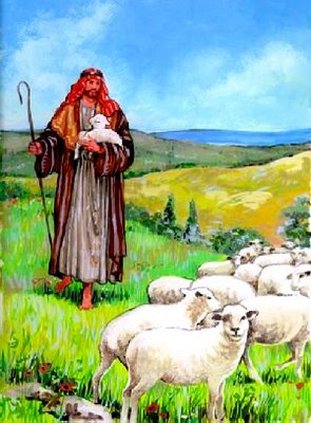
Ezekiel 34 is the chapter wherein God denounces the leaders of Israel as false shepherds for their poor care of His people. Instead of caring for the sheep of Israel, they cared for themselves. They ate well, were well-clothed and well-cared for by the very people they had been placed over (Ezekiel 34:1-3). By contrast, Jesus is the Good Shepherd who lays down His life for the sheep and who protects them from the wolves who would destroy the flock (John 10:11-12). Verse 4 of chapter 34 describes people whom the shepherds failed to minister to as weak, sick, injured and lost. Jesus is the Great Physician who heals our spiritual wounds (Isaiah 53:5) by His death on the cross. He is the one who seeks and saves that which is lost (Luke 19:10).
The Lion's Den (Daniel)
We see in the stories of the fiery furnace and Daniel in the lions’ den a
foreshadowing of the salvation provided by Christ. The three men declare that God is a saving God who can provide a way of escape from the fire (Daniel 3:17). In the same way, by sending Jesus to die for our sins, God has provided an escape from the fires of hell (1 Peter 3:18). In Daniel’s case, God provided an angel to shut the lions’ mouths and saved Daniel from death. Jesus Christ is our provision from the dangers of the sin that threatens to consume us.
The Lion's Den (Daniel)
We see in the stories of the fiery furnace and Daniel in the lions’ den a
foreshadowing of the salvation provided by Christ. The three men declare that God is a saving God who can provide a way of escape from the fire (Daniel 3:17). In the same way, by sending Jesus to die for our sins, God has provided an escape from the fires of hell (1 Peter 3:18). In Daniel’s case, God provided an angel to shut the lions’ mouths and saved Daniel from death. Jesus Christ is our provision from the dangers of the sin that threatens to consume us.
The Gentiles as God's Children (Hosea)
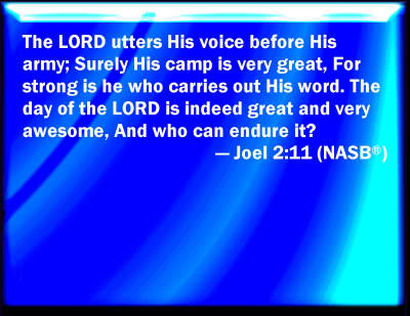
Hosea 2:23 is the wonderful prophetic message from God to include the Gentiles [non-Jews] as His children as recorded also in Romans 9:25 and 1 Peter 2:10. Gentiles are not originally “God’s people,” but through His mercy and grace, He has provided Jesus Christ, and by faith in Him we are grafted into the tree of His people (Romans 11:11-18). This is an amazing truth about the Church, one that is called a “mystery” because before Christ, God’s people were considered to be the Jews alone. When Christ came, the Jews were temporarily blinded until the “full number of the Gentiles has come in” (Romans 11:25).
The Day of Judgment (Joel)
Whenever the Old Testament speaks of judgment for sin, whether individual or national sin, the advent of Jesus Christ is foreshadowed. The prophets of the Old Testament continually warned Israel to repent, but even when they did, their repentance was limited to law-keeping and works. Their temple sacrifices were but a shadow of the ultimate sacrifice, offered once for all time, which would come at the cross (Hebrews 10:10). Joel tells us that God’s ultimate judgment, which falls on the Day of the Lord, will be “great and terrible. Who can endure it?” (Joel 2:11). The answer is that we, on our own, can never endure such a moment. But if we have placed our faith in Christ for atonement of our sins, we have nothing to fear from the Day of Judgment.
God's land Promise (Amos)
The Book of Amos ends with a glorious promise for the future. “’I will
plant Israel in their own land, never again to be uprooted from the land I have given them,’ says the LORD your God” (9:15). The ultimate fulfillment of God’s land promise to Abraham (Gen. 12:7; 15:7; 17:8) will occur during Christ’s millennial reign on earth (see Joel 2:26,27). Revelation 20 describes the thousand-year reign of Christ on the earth, a time of peace and joy under the perfect government of the Savior Himself. At that time, believing Israel and the Gentile Christians will be combined in the Church and will live and reign with Christ.
Deliverers of the Gospel (Obadiah)
Verse 21 of the Book of Obadiah contains a foreshadowing of Christ and His Church. “Then saviors shall come to Mount Zion to judge the mountains of Esau, And the kingdom shall be the LORD’s” (NKJV). These “saviors” (also called “deliverers” in several versions) are the apostles of Christ, ministers of the word, and especially the preachers of the Gospel in these latter days. They are called "saviors," not because they obtain our salvation, but because they preach salvation through the Gospel of Christ and show us the way to obtain that salvation. They, and the Word preached by them, are the means by which the good news of salvation is delivered to all men. While Christ is the only Savior who alone came to purchase salvation, and is the author of it, saviors and deliverers of the Gospel will be more and more in evidence as the end of the age draws near.
The Day of Judgment (Joel)
Whenever the Old Testament speaks of judgment for sin, whether individual or national sin, the advent of Jesus Christ is foreshadowed. The prophets of the Old Testament continually warned Israel to repent, but even when they did, their repentance was limited to law-keeping and works. Their temple sacrifices were but a shadow of the ultimate sacrifice, offered once for all time, which would come at the cross (Hebrews 10:10). Joel tells us that God’s ultimate judgment, which falls on the Day of the Lord, will be “great and terrible. Who can endure it?” (Joel 2:11). The answer is that we, on our own, can never endure such a moment. But if we have placed our faith in Christ for atonement of our sins, we have nothing to fear from the Day of Judgment.
God's land Promise (Amos)
The Book of Amos ends with a glorious promise for the future. “’I will
plant Israel in their own land, never again to be uprooted from the land I have given them,’ says the LORD your God” (9:15). The ultimate fulfillment of God’s land promise to Abraham (Gen. 12:7; 15:7; 17:8) will occur during Christ’s millennial reign on earth (see Joel 2:26,27). Revelation 20 describes the thousand-year reign of Christ on the earth, a time of peace and joy under the perfect government of the Savior Himself. At that time, believing Israel and the Gentile Christians will be combined in the Church and will live and reign with Christ.
Deliverers of the Gospel (Obadiah)
Verse 21 of the Book of Obadiah contains a foreshadowing of Christ and His Church. “Then saviors shall come to Mount Zion to judge the mountains of Esau, And the kingdom shall be the LORD’s” (NKJV). These “saviors” (also called “deliverers” in several versions) are the apostles of Christ, ministers of the word, and especially the preachers of the Gospel in these latter days. They are called "saviors," not because they obtain our salvation, but because they preach salvation through the Gospel of Christ and show us the way to obtain that salvation. They, and the Word preached by them, are the means by which the good news of salvation is delivered to all men. While Christ is the only Savior who alone came to purchase salvation, and is the author of it, saviors and deliverers of the Gospel will be more and more in evidence as the end of the age draws near.
Jonah and the Whale (Jonah)
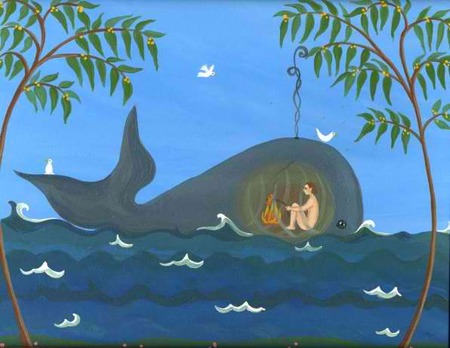
That Jonah is a type of Christ is clear from Jesus’ own words. In Matthew 12:40-41, Jesus declares that He will be in the grave the same amount of time Jonah was in the whale’s belly. He goes on to say that while the Ninevites repented in the face of Jonah’s preaching, the Pharisees and teachers of the Law who rejected Jesus were rejecting One who is far greater than Jonah. Just as Jonah brought the truth of God regarding repentance and salvation to the Ninevites, so too does Jesus bring the same message (Jonah 2:9; John 14:6) of salvation of and through God alone
(Romans 11:36).
(Romans 11:36).
